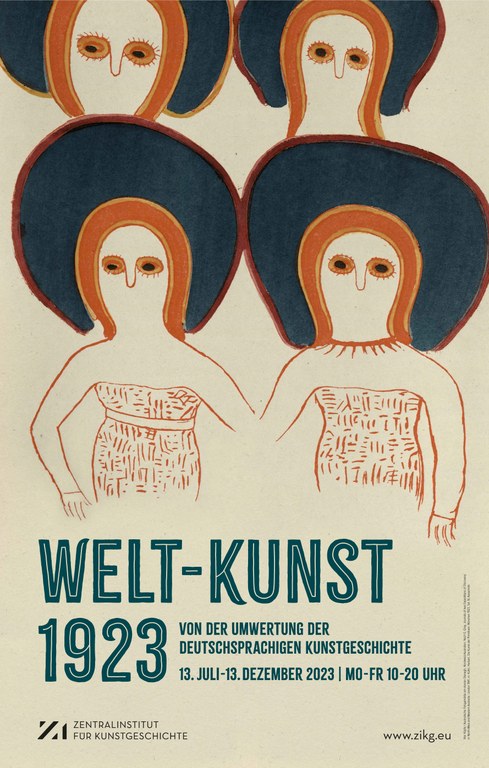Ausstellungseröffnung // Welt-Kunst 1923. Von der Umwertung der deutschsprachigen Kunstgeschichte
Termindetails
Wann
von 18:30 bis 20:00
Wo
Eröffnung der Ausstellung // Welt-Kunst 1923. Von der Umwertung der deutschsprachigen Kunstgeschichte.
Mit Vorträgen von Hans Christian Hönes, Monica Juneja und Matthew Vollgraff.
// World Art and the “Streit der Fakultäten“ // Hans Christian Hönes
After the Empire’s defeat in the first World War, many German academics were yearning for an intellectual renewal, intended to heal a fractured and beaten society by promoting a more holistic form of existence. “Synthesis” became one of the buzzwords of the day, motivating – among others – attempts to broaden the remit of art history in order to include global cultures and objects thus far considered to be ‘non-art’.
Intellectually, these were exciting proposals. But at the same time, there was much at stake. Broadening the scope of art history was a daring prospect – and one that intruded on the territory of other disciplines such as Egyptology, Indology, or Byzantine studies, fields that were unwilling to yield ground. My paper aims to demonstrate that defining the remit of art history was never just a decision solely in the hands of art historians. Re-drawing disciplinary boundaries also depended on institutional dynamics and inter-faculty struggles for resources and power.

Dr Hans C. Hönes is Senior Lecturer in Art History at the University of Aberdeen (Scotland). He received his PhD from LMU Munich in 2013. Dr Hönes has published extensively on art and historiography since the 18th century. His third monograph Tangled Paths. A Life of Aby Warburg is forthcoming with Reaktion Books in spring 2024.
// The legacy of Welt Kunst. Art History and the Limits of Inclusion// Monica Juneja
The presentation queries the lessons we can learn from precedents of a century ago when art history nurtured the ambition to produce authoritative knowledge about nations, cultures, and the world. How did this thinking constitute the epistemic foundations of a discipline that continues to shape our scholarly practice in the present, at a historical moment when art history strives once more to become ‘global’? While Welt Kunst and its histories have several present-day avatars, I wish to argue for a reflexive, transculturally oriented globality to eschew the pitfalls of evolutionist teleologies. How might we craft a more plausible theoretical scaffolding that would enable the discipline to respond to the challenge of cultural plurality and show the way to an equitable art history that can break out of different shades of parochialism, while retaining its situatedness in specific contexts?
Monica Juneja is Professor of Global Art History at the Heidelberg Centre for Transcultural Studies, University of Heidelberg. Her research interests include transculturation and visual representation, the disciplinary practices of art history in South Asia, the history of visuality in early modern South Asia, heritage and architectural histories in transcultural perspective. She has recently published Can Art History be Made Global? Meditations from the Periphery (De Gruyter, 2023), for which she received the Opus Magnum award of the Volkswagen Foundation.
// World Art and Imperial Infantilization in Karl Lamprecht's 1914 ‘Hall of Culture’ Exhibition // Matthew Vollgraff
In the summer of 1914, just months before the outbreak of world war, the first historical exhibition of ‘world art’ opened at an international trade fair in Leipzig. Curated by the historian Karl Lamprecht, this “Hall of Culture” was a cosmopolitan affair that showcased photographic reproductions of artworks from ancient Greece, India, China, Japan, Mesoamerica, and prehistoric Europe. Yet the show also paralleled those images with drawings by children around the world, which it displayed explicitly as indicators of ethnic or national mental development. Taking Lamprecht's long-overlooked exhibition as its focus, my talk situates the origins of the discourse on ‘world art’ at the perilous convergence of universal history, child psychology and the colonial politics of the late Wilhelmine Empire.
Matthew Vollgraff is a cultural historian of modern central Europe. His research deals with the circulation of knowledge between the arts, humanities and the natural sciences, with particular attention to the intertwined histories of anthropology and aesthetics. From 2023–2024 he is a NOMIS Fellow at eikones - Center for the Theory and History of the Image, University of Basel. He previously held research positions at the Warburg Institute, University of London; the University of Hamburg; and the Center for Literary and Cultural Research, Berlin. He received his PhD from Princeton University in 2019.
[Caption Thumbnail: Vier Köpfe / Australische Felsgemälde am oberen Glenegh, Nordwest-Australien. Nach G. Grey, Journals of two Expeditions of Discovery in North-West and Western Australia. London 1841, in: Kühn, Herbert. Die Kunst der Primitiven. München 1923, Taf. IV, Ausschnitt]
TEILNAHME:
Die Veranstaltung findet vor Ort im ZI statt und wird parallel via Zoom übertragen. Dem Zoom-Meeting können Sie unter folgendem Link beitreten: https://us02web.zoom.us/j/85659345839?pwd=UmFZYU0xN1NxMGJ1MjlQM054NXgvZz09. Meeting-ID: 856 5934 5839 | Passwort: 148258.
